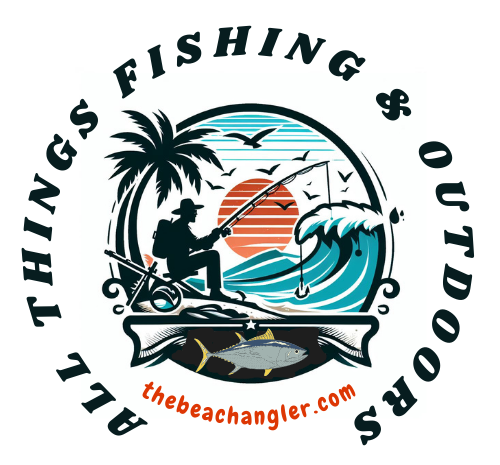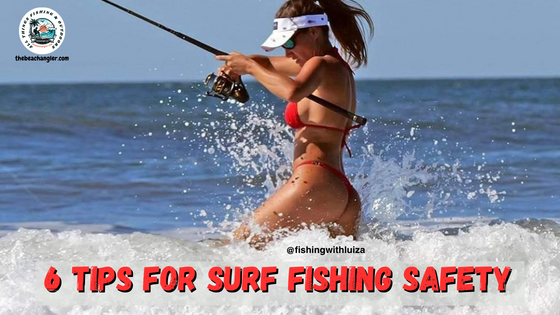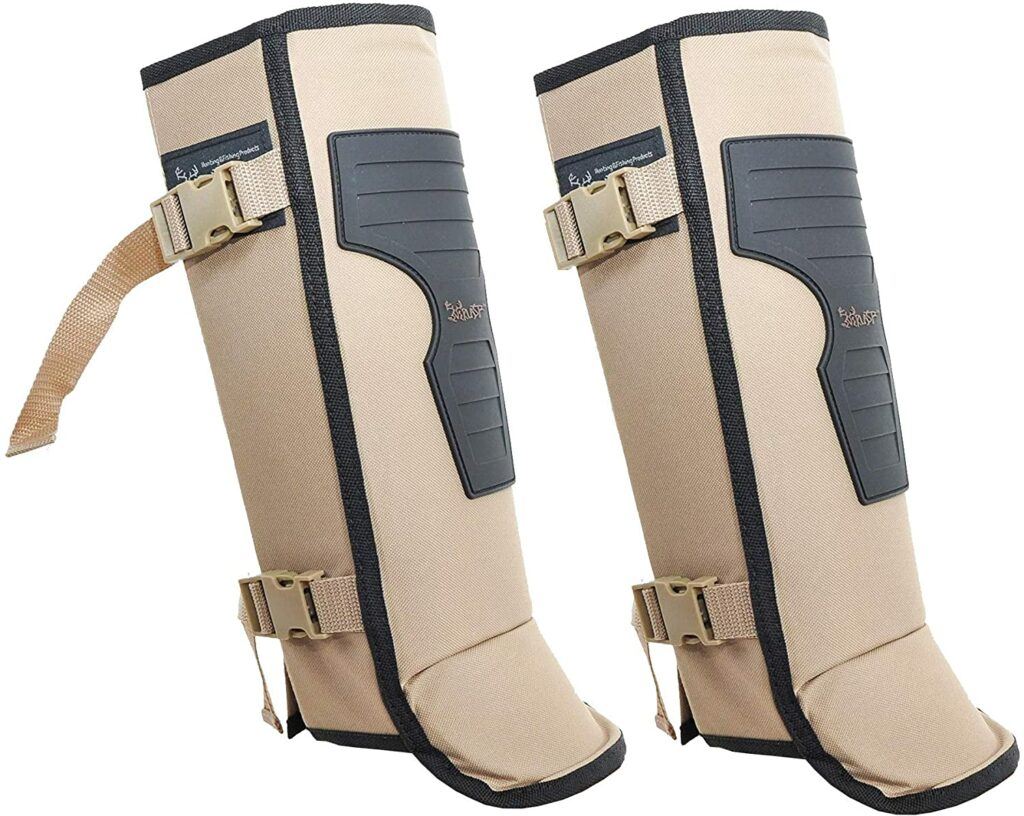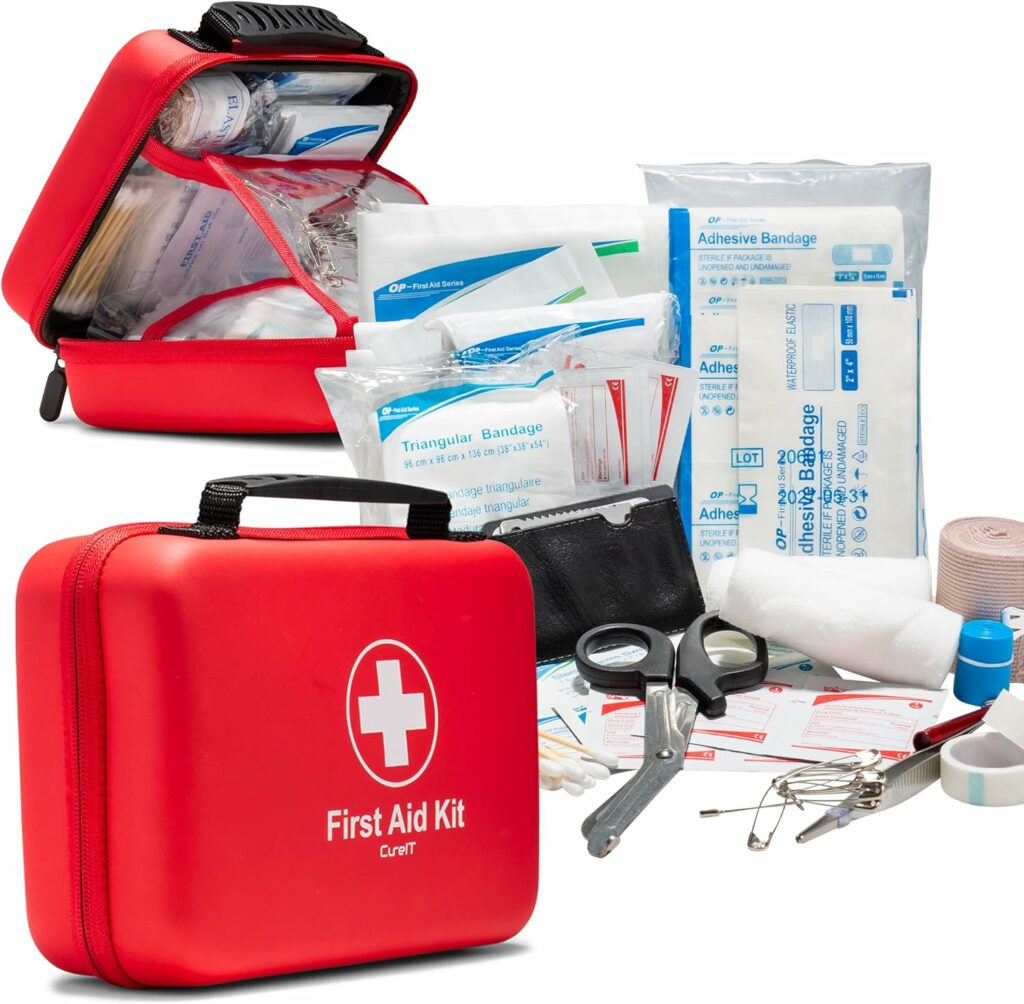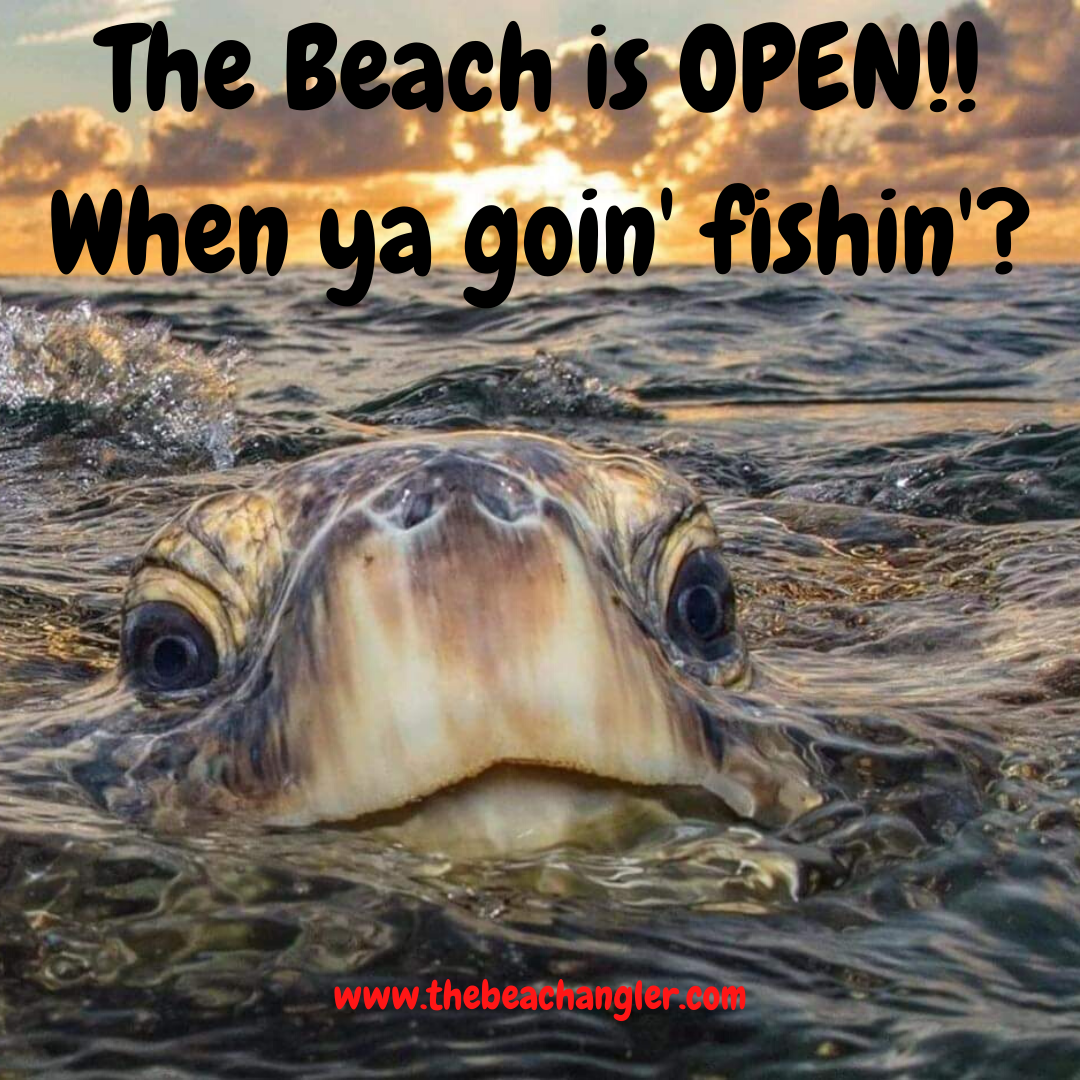Surf fishing offers a blend of excitement and tranquility, as you cast your line into the vastness of the sea. However, as with any venture that pits us against the might of nature, it’s vital to prioritize safety. Stepping onto the beach with your fishing rod in hand, you should be equipped with more than just bait and tackle; a safety-first mindset is your most crucial gear.
QUICK LOOK: 6 Surf Fishing Safety Tips
- Check with the Locals – they can give you inside information on tides, underwater hazards, and even good fishing locations.
- Check the Weather Forecast – be aware of storms, strong winds, and UV forecasts.
- Check the Tide Charts – watch out for abnormally high tides as they can produce strong rip currents and flood the beach.
- Pack Your Safety Gear – be sure to bring a life jacket, first aid kit, sun protection, flashlights, and phone.
- Let Someone Know Your Plans – tell someone where you will be going and when you plan to return.
- Never go surf fishing alone – waves and currents can turn a fun day of fishing into a dangerous situation in an instant. The buddy system could save your life.
Powerful waves, changing tides, strong currents, and shifting sands make surf fishing a unique environment with challenges that don’t apply to other forms of angling. It’s not just about catching fish; it’s about returning home safely with great memories and experiences. An awareness of potential hazards and the knowledge of how to handle, and be prepared for them can make all the difference.
Before you load up your gear and head to the beach, take a few moments, and let’s get an introduction to safety. It’s not only about the do’s and don’ts; it’s understanding that every wave and every tide you face is as unpredictable, and potentially dangerous, as it is beautiful.
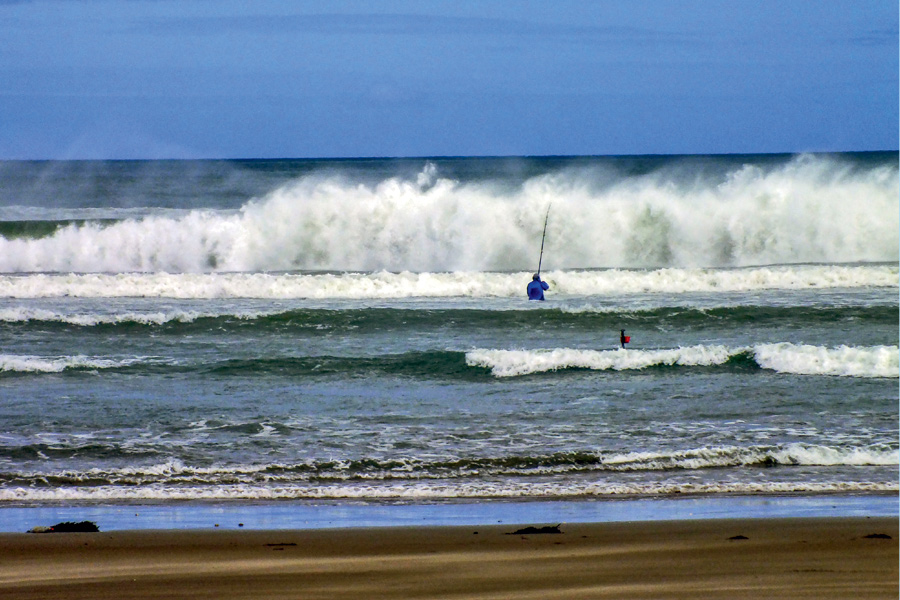
Keep reading and, we’ll move on to equipping you with the practical knowledge, equipment, and tools to help ensure that your surf fishing adventure is as safe as it is enjoyable. Remember, the ocean can be very unforgiving and there are no do-overs when it comes to drowning.
Safety and Preparing for Your Surf Fishing Adventure
As with any adventure, preparation is key to not only making the most of your time but also ensuring you return home safely. Before you set foot on the sand with your fishing rod in hand, there are a few essential safety measures that require your attention.
Safety starts with the right gear. Your checklist should include a high-quality life vest, particularly if you plan to wade into the water; and nonslip water shoes to tackle slippery surfaces and protect your feet from sharp objects.
I can’t stress enough how important it is to not skimp on sunscreen. Skin cancer is no joke, I speak from experience. A quality water-resistant sunscreen and a hat and sunglasses to shield you from the unforgiving glare of the sun will save you a lot of pain later.
When planning a surf fishing trip, checking the weather forecast is not just a suggestion, it’s a must. Sudden weather changes can transform a seemingly perfect day into a rough and risky situation.
Pay special attention to warnings about high winds, storms, extreme high tides, and potential rip currents. And, always give yourself enough time to leave the beach if the conditions turn for the worse.
Tides play a massive role in surf fishing, and you’ll want to familiarize yourself with the local tide charts. High tide might bring the fish closer, but it can also bring significant risks with rougher waves and push water to the dune line leaving you fewer escape routes should you need to retreat.
Connect with local anglers, and tackle shops too; they can offer invaluable insights. Local knowledge about hidden underwater obstacles, the behavior of the tide at different times of the year, and even which areas are best for fishing can be the difference between a good trip and a close call.
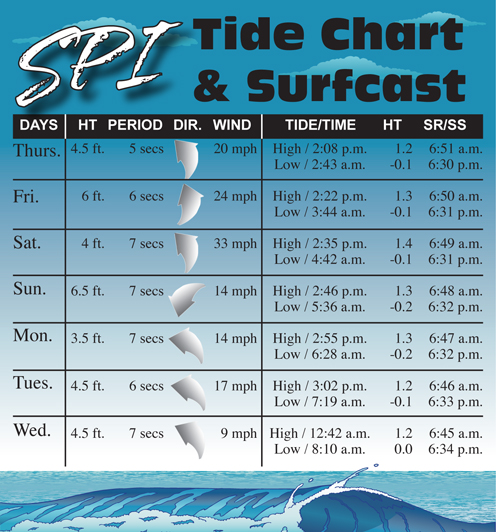
Keys to Surf Fishing Safety
As someone who loves surf fishing, I know firsthand that it demands respect for the ocean’s power. Safety in the surf starts with recognizing the potential dangers and having strategies and equipment to manage the risks.
A simple but crucial step is ensuring a safe casting area. Give other anglers and beach users a wide berth. Keeping a sensible distance between yourself and fellow anglers and beachgoers helps prevent accidents from flying hooks and tangled lines. It’s not just about politeness; it’s a core safety practice.
The ocean is home to more than just fish; various aquatic creatures share these waters. Wear appropriate footwear to protect against sharp shells and potential stings from sea life like jellyfish or stingrays. I’ve had the unpleasant experience of a stingray encounter, you want to avoid it if you can. Shuffle your feet when wading the surf and wear protective shoes or rayguards.
rip currents are a silent hazard in surf fishing. They can pull even the strongest swimmers out to sea. I learned to spot the signs of rip currents: areas of churning, choppy water, differing wave patterns, or a line of foam, seaweed, or debris moving seaward. If caught in one, remain calm, conserve energy, and swim parallel to the shoreline until free from the current’s pull.
If at all possible, never go surf fishing alone. I don’t care how good of a swimmer you think you are, it only takes one rogue wave or wrong step to turn a fun day into a potential disaster. Always tell someone where you will be fishing and when you expect to be back.
Nighttime surf fishing amplifies certain risks and warrants additional precautions. I always equip myself with a headlamp and reflective clothing, which are vital for visibility. But the night brings more than just darkness; it alters the landscape and can be disorienting. And larger predators like sharks venture closer to shore to feed.
Safety Tips for Nighttime Surf Fishing
When the sun sets, surf fishing can transform into an entirely new experience. However, casting lines under a starry sky calls for additional precautions. fishing in the dark increases risks, so you must prioritize safety. Here’s how to stay safe while reeling in the big ones at night.
Start by enhancing your visibility. Wear reflective clothing, and keep a waterproof flashlight or headlamp on hand. Not only does this help you see, but it also ensures others can spot you from a distance in case you find yourself needing help. Safety markers, glowsticks, or glow-in-the-dark tape on your gear can be useful tools for nighttime surf fishing.
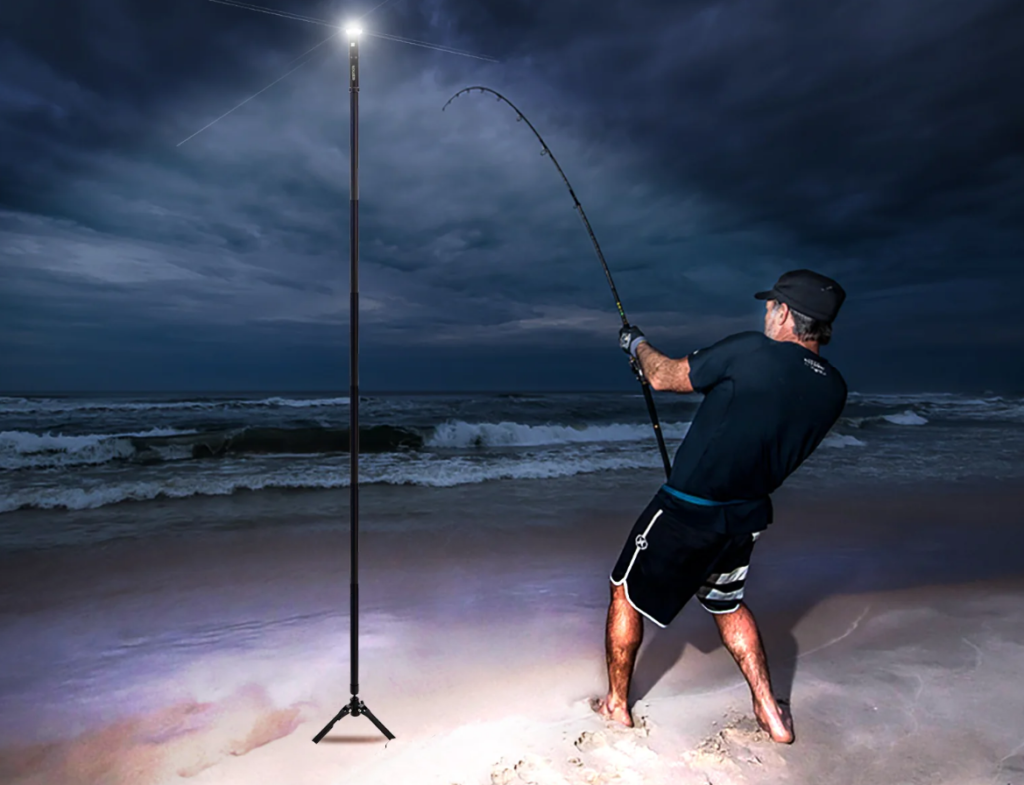
Next, consider your surroundings. Familiarize yourself with the environment during the day if possible. At night, stay alert for the changing tides, rip currents, and the potential for unforeseen obstacles on the shore.
Make sure you can find your way back to your vehicle or campsite to prevent disorientation. Have a lantern or other light source on shore at your campsite so you can find your way back to shore in the dark.
Never underestimate the power of the buddy system. Fishing alone at night increases the risk of accidents or emergencies going unnoticed. Having a partner means an extra set of eyes for safety, assistance with gear, and immediate help if you encounter any problems.
Lastly, keep communication tools handy. A fully charged phone in a waterproof case, or even a portable marine radio, will keep you connected to the outside world. Again, it’s best to inform someone regarding your location and expected return time before you head out.
First-Aid Preparedness for Surf Fishing
I can’t stress enough the importance of having a well-prepared first-aid kit when you go surf fishing. Accidents can happen, and being equipped with the right supplies can make a significant difference in how they’re handled. Let’s walk through what you should have in your kit.
First, include sterile dressings, bandages, and antiseptic wipes for dealing with cuts or abrasions, which are common.
Don’t forget a pair of tweezers for removing any embedded hooks or debris, and a pair of scissors for cutting lines or bandages.
A good pair of pliers with a wire cutter to cut barbs off hooks can be a trip-saver. Sunscreen and a burn relief gel are also must-haves, considering the time you’ll spend exposed to the sun.
Next, you’ll want to be prepared for more serious events such as allergic reactions or dehydration.
Ensure your first-aid kit has antihistamines and rehydration salts. Include any prescription medications you are taking. It would be wise to also add a basic instruction manual for reference in case you’re unsure about treatment.
While many injuries can be treated on the scene, know when an injury is too severe, and professional medical assistance is necessary. For example, if you or a fellow angler experiences severe bleeding, breathing difficulties, or a suspected broken bone, it’s time to call for help immediately. This is where that phone or marine radio could be a lifesaver.
Plan Your Next Trip Stay Safe and Enjoy the Surf
By now, you’re equipped with essentials for prevention, precaution, and care in case things get slippery. Remember: preparation is synonymous with prevention. Each trip may vary but your commitment to safety should remain steadfast.
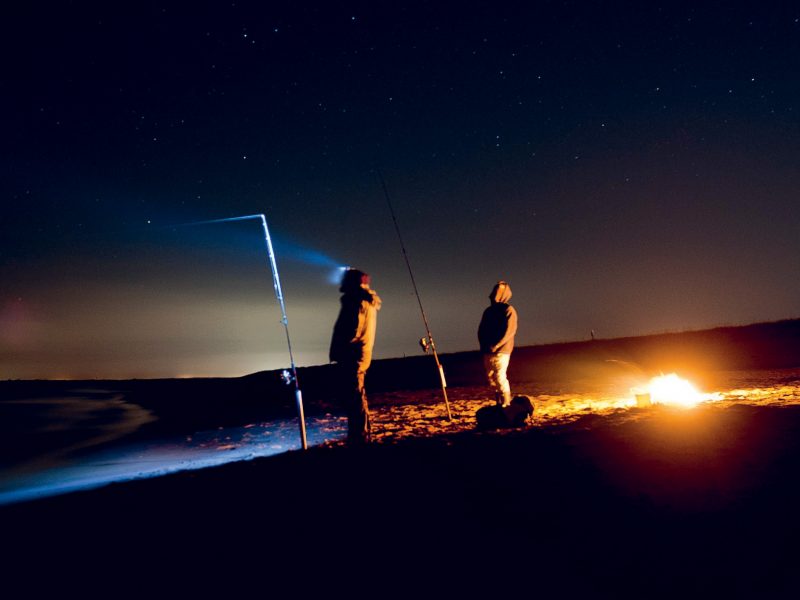
When planning a surf fishing trip and the safety considerations, reach out to local fishing communities, consult experts, or scour reliable online fishing forums for more information, or leave a comment below and I’ll get back to you ASAP.
I encourage you to revisit these safety tips regularly. Being over-prepared is better than the opposite, and familiarity breeds confidence. So, plan your trip with care and your surf fishing adventures will bring you nothing but joy and success. Tight lines and safe returns!
As always, stay safe, enjoy the journey and please try to leave it cleaner than you found it. If you have any comments, questions, ideas, or suggestions please leave them in the comment section below and I’ll get back to you ASAP. You can follow us on Facebook: Rex The Beach Angler, Instagram: thebeachangler7, Twitter: @AnglerBeach, and YouTube: Man Art Creations.
- Using a Personal Watercraft For Saltwater Fishing

- 5 Advantages of the Penn Squall Low Profile Baitcasting Reels
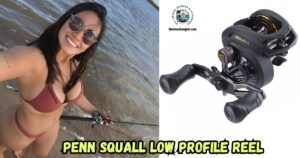
- Electronic Fish Finders For Kayak Fishing

P.S. – Thanks so much for checking out our blog we really appreciate it. Just so you know, we may receive a commission if you click on some of the links that appear on our site. This helps us keep our content free and up-to-date for everyone. We appreciate your support!
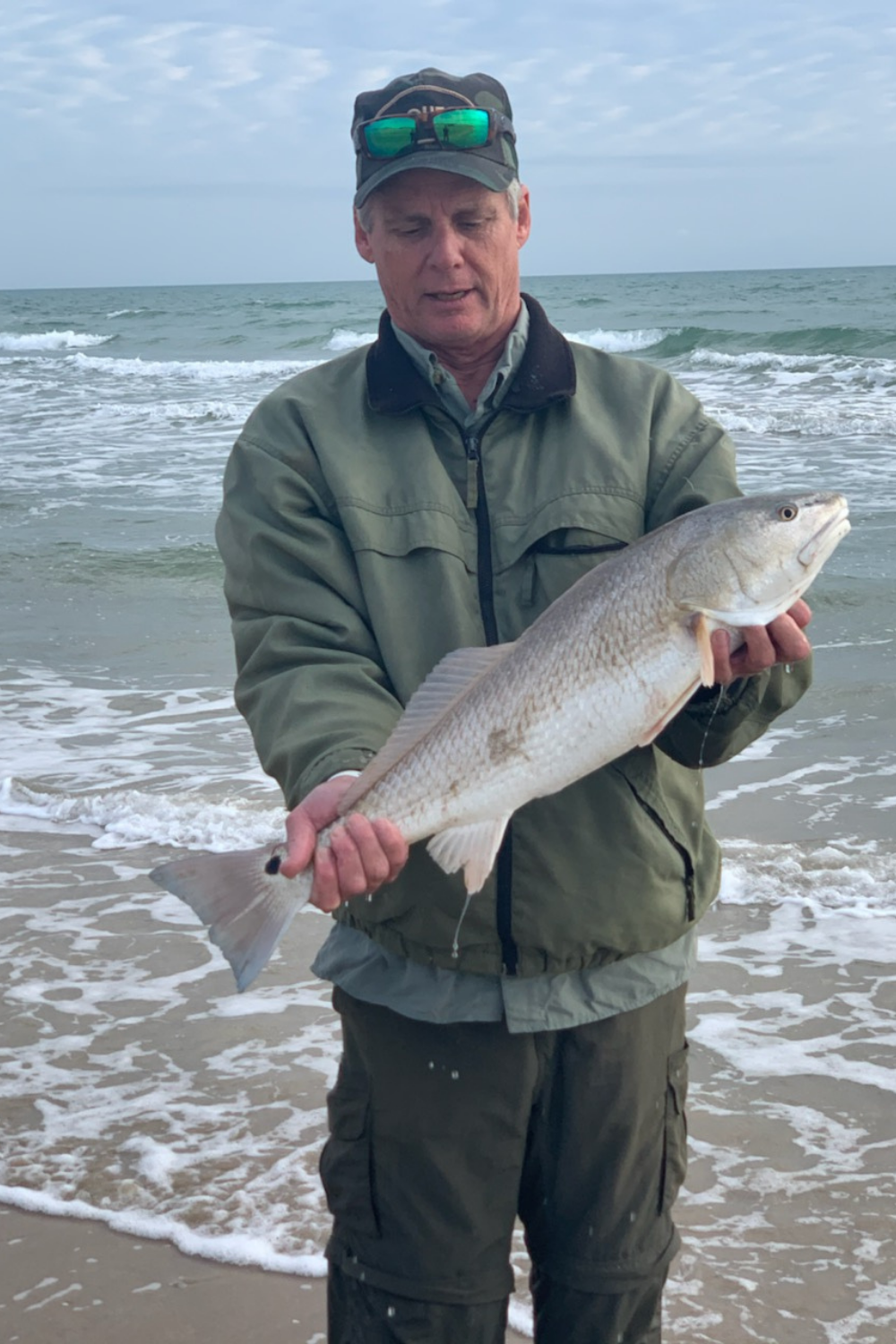
A life long surf fisherman with 50+ years of experience, I am also an avid hunter and outdoorsman. I will be sharing my passion for the outdoors with you so be prepared for hunting, fishing, camping, hiking and more. Along with gear reviews and the latest trends and innovations in the outdoor industry.
